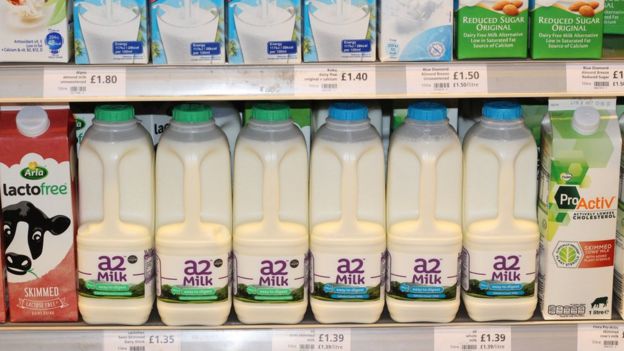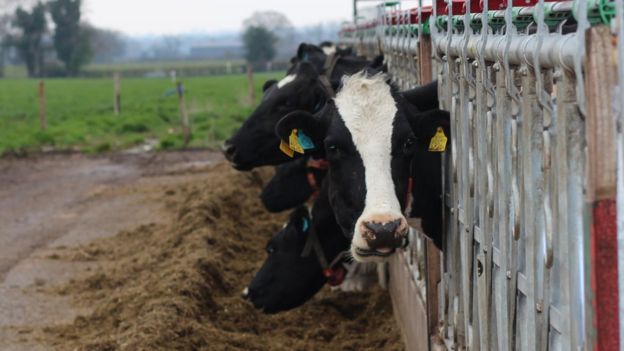The milk looks and tastes like conventional cow’s milk – being marked today by the Food and Agriculture Organization in its World Milk Day – but proponents claim it is more easily digested.
Mr Sadler is a third-generation dairy farmer from Shropshire. He’s been selling the milk his cows produce to global dairy firm The a2 Milk Company since 2012.
And he’s a firm believer in the product.
«A friend of mine recently moved onto [the milk] because of problems with irritable bowel syndrome. Now he’s a total convert to it and those problems have gone,» he says.
«From my own point of view, I’ve had eczema all my life. Within three weeks of converting our herd to A2, my eczema disappeared.
«It was astonishing. I never would’ve believed in all the years that I’ve had eczema that it was linked to a dairy intolerance, but it was.»
- A2 cow’s milk only contains the A2 type of beta-casein protein, rather than the A1 protein commonly found in regular milk
- A1 and A2 beta-casein are genetic variants of the beta-casein milk protein that differ by one amino acid
- African and Asian cattle produce mainly A2 beta-casein, the A1 protein is common in herds in the US, Australia, New Zealand and most of Europe
- A genetic test will determine whether a cow produces the A2 or A1 type protein in its milk – allowing farmers to selectively breed the dairy cattle they want
Alternative milk
Mr Sadler is not the only one convinced of the benefits.
The a2 Milk Company already has a 9% share of the milk market in Australia, where the company is based. Now it’s hoping to achieve similar success in Britain and the US by convincing people to stop drinking dairy alternatives and give cow’s milk another try.
«People think they’ve got issues with milk,» says Scott Wotherspoon, the firm’s UK chief executive. «So they start drinking things like soy milk or almond milk.
«If you can show them not all milk is the same, then you can bring them back to milk and they can realise that the discomfort they felt with milk is not necessarily to do with things like lactose, it’s actually to do with the protein that’s in milk.»
According to the company, a protein called A1 in regular cow’s milk is behind many milk-related digestion issues. In its product, that protein is replaced with a rarer protein called A2.
To strengthen its case, the firm has sponsored a medical trial in China. Forty-five people drank either regular milk or A2 milk at different times, while scientists at Shanghai’s Fudan University studied how their bodies reacted.
The results have been published in Nutrition Journal. Gastroenterologist Xia Lu was part of the research team.
«Those that drank milk containing only A2 had no gastrointestinal disturbance, compared to those who drank A1, who had high inflammation, bloating and constipation,» she says.
Unsurprisingly, The a2 Milk Company is heavily promoting the results.

Though quick to point out that its milk isn’t suitable for those who are lactose intolerant, the company says the research could be significant for many who wrongly believe themselves to be allergic to milk.
Claims questioned
But not everyone is convinced. A number of experts in Australia have rejected the company’s claims.
In the past, The a2 Milk Company suggested the A1 protein in regular cow’s milk could be harmful, linking it to diabetes, autism and heart disease. But the claims were dismissed by scientists who concluded there was no such evidence.
The a2 Milk Company even tried to petition regulators in Australia and New Zealand to put a health warning on ordinary milk, but that was rejected.

«The randomised controlled trials are showing fairly small differences that one might say are not important enough to matter,» he says. «Nevertheless, they do show a difference.
«We also know that A2 milk has physiological properties that are different to regular milk. For example, it doesn’t form a curd so easily. So there is a difference between the two products and that’s intriguing from a scientific point of view.
«What really needs to happen is for those claims to be investigated by independent researchers.»
The firm hopes the study will boost its sales in China, where milk consumption has increased rapidly over the past two decades.
«In a market where dairy consumption is about 20% of typical European levels, we’re aiming to grow very significantly,» Mr Wotherspoon says.
Back on his dairy farm in Shropshire, Neale Sadler’s cows queue up to be milked by his robotic milking machine. Every day he collects around 1,600 litres of milk from his 75 cows.
«The bonus we get paid for producing A2 milk is 2.5p per litre. At the moment that’s not a vast amount but it’s growing all the time and I can see A2 milk being very important in the future,» he says.
